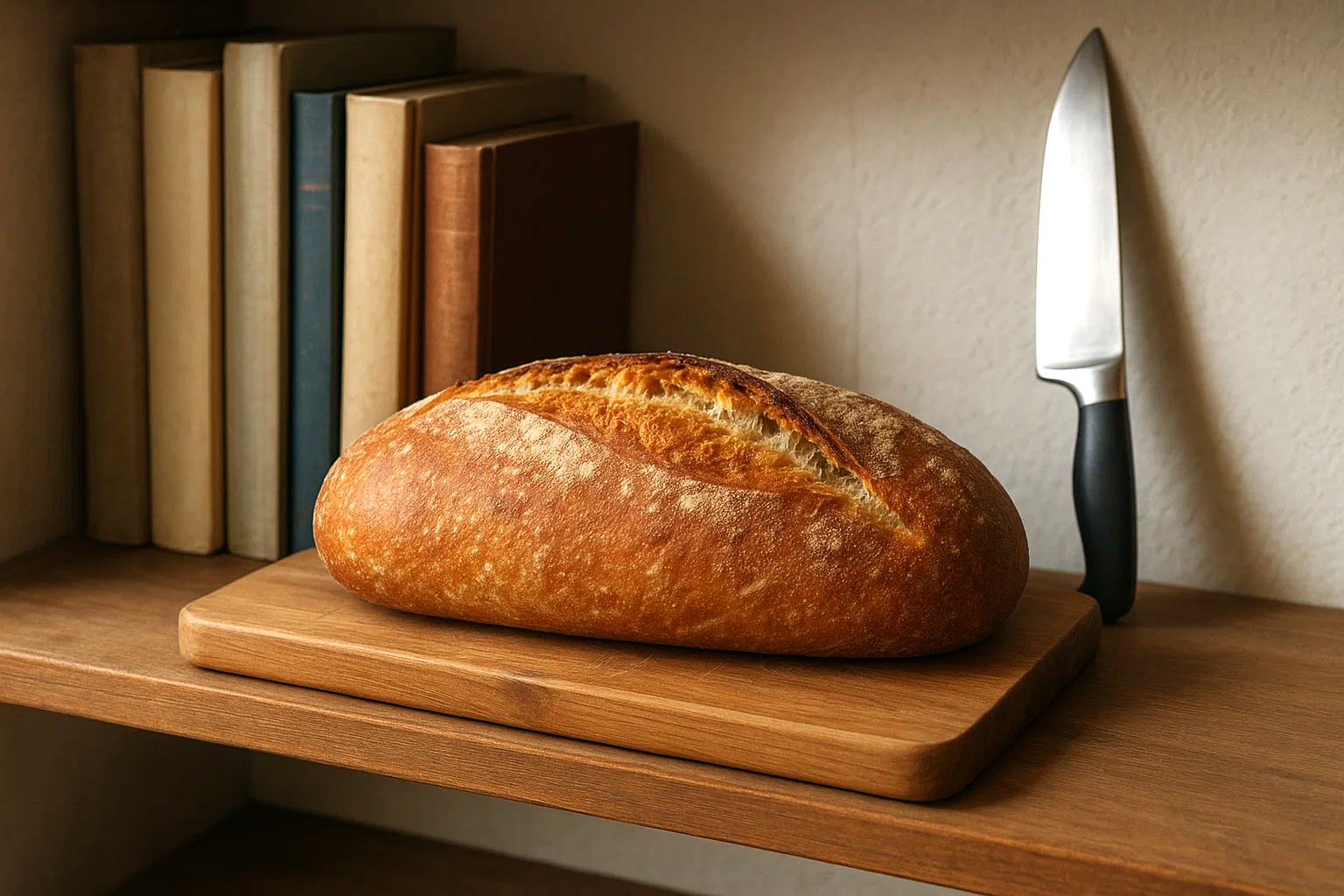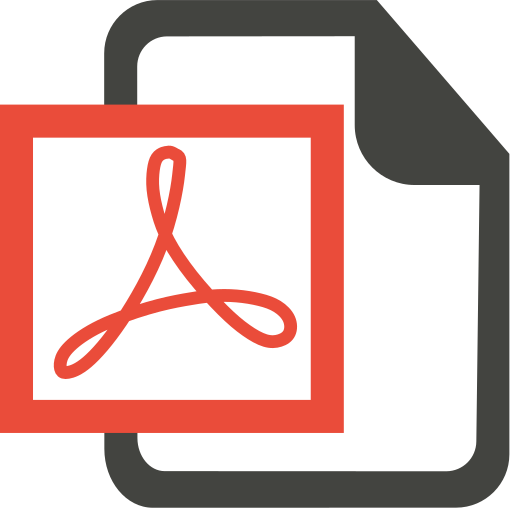Full Episode Audio (download link is to the right of the volume icon)
Listening Comp. Audio (download link is to the right of the volume icon)
Welcome to Lesson #19 of Stress Free German. We start today with a neuter image which has four new elements. So imagine a loaf of bread on a cutting board. The board is on a shelf, and behind it are some books and a large, shiny carving knife. So the shelf is our neuter anchor. And again, our four new concrete nouns are…
bread, knife, board, book
Brot, Messer, Brett, Buch
The first and last are fairly easy. Brot is bread and Buch is book.
Let’s try a phrase with each. You’re not sure if the bread near you on the table is yours.
Ask: Is this my bread?
Ist das mein Brot?
Where is my book?
Wo ist mein Buch?
Those words fit nicely with our philosophy of being flexible: From bread to Brot. From book to Buch. Unfortunately the German words for knife and board aren’t so obvious:
Messer, Brett
That is a small knife.
Das ist ein kleines Messer.
Admiring the smooth, hardwood cutting board, you say:
This is a good board.
Das ist ein gutes Brett.
Let’s try one more round. In the bakery say:
I would have with pleasure one bread.
Ich hätte gerne ein Brot.
to a friend: Your book is on the shelf.
Dein Buch ist auf dem Regal.
Looking to do some cooking in your friend’s kitchen, ask:
Do you have a board?
Hast du ein Brett?
Alright! Armed with some new words, we’re ready to head outside. So Lisa stands up and opens the door…
Gehen wir jetzt in die Bäckerei?
Warum nicht?
In the bakery, after the greetings and the How can I help you exchange, Lisa points to a dark, dense-looking loaf of bread. Then holds up one finger…
Einmal Vollkornbrot, bitte.
Well, she ordered some kind of bread, I caught that. When you think about it, it makes sense that we’d encounter variations on that word. I mean, there are all sorts of breads in the world. Dark bread, white bread, rye bread, and so on.
Maybe you heard the relation between full and voll. Full grain….Vollkorn.
So she asked for a full-grain or “whole wheat” bread. Vollkornbrot
Einmal Vollkornbrot, bitte.
And then Thomas orders by pointing to a loaf of whitebread and holding up one finger.
Einmal Weißbrot.
Is he saying “white”? Weiß
Whitebread…. Weißbrot
Okay. I get that now. But what’s up with that word einmal? We’ll ponder in a moment….
(MUSIC)
So einmal is obviously functioning here as “one.” Right? One bread, please. But more literally, what you’re really saying is “one time,” “one instance” or even just “once” of bread. And if we want two loaves?
Zweimal Vollkornbrot, bitte.
Two whitebreads, please.
Zweimal Weißbrot, bitte.
Imagine we’re in a bakery in Salzburg, where they sell bread and Mozartkugels.
Listen to Lisa’s order:
Einmal Sonnenblumenkernbrot, bitte. Und zwei Mozartkugeln.
Hmm….Be flexible, right? So the German word Sonnen sounds like sun. Blume…well that’s flower. So Sonnenblume is sunflower? And kern…sounds like kernel, which is a seed. So, ah!
Sunflower seed bread!
Sonnenblumenkernbrot
I am totally ordering that the next time I’m in a bakery.
(swell)
Try to say: The bread is on the table.
Das Brot ist auf dem Tisch.
Your book is on the floor.
Dein Buch ist auf dem Boden.
I love this cutting board.
Ich liebe dieses Brett.
I love this knife.
Ich liebe dieses Messer.
Back in the bakery, try to say the following:
I would have with pleasure two loaves of white bread.
Ich hätte gerne zweimal Weißbrot.
Any guess on how to say “three” of something? Count with us to three… eins zwei drei
Dreimal
Listen as Tanya orders for five people:
Zweimal Orangensaft bitte, und dreimal Tee.
You try it: We want to order: Two OJs and three teas. Literally we’ll say…
Twice orangejuice please, and three-times tea.
Zweimal Orangensaft bitte, und dreimal Tee.
Last one before we switch to a new topic. So, do you think you can say:
I would have with pleasure one Sunflower seed bread.
Ich hätte gerne einmal Sonnenblumenkernbrot.
Awesome!
(MUSIC)
So, a new verb today and it’s our first look at something called a separable verb. Fow now, imagine you’re with a friend in a grocery store. Her cellphone rings, and she tells the caller…
Ich kaufe im Supermarkt ein.
The verb she used is actually einkaufen. But when Germans conjugate it, the front part separates and gets added to the end of the sentence. You try it:
I’m shopping in the supermarket.
Ich kaufe im Supermarkt ein.
English kind of does this, with something called phrasal verbs. Think of the phrase: I cleaned the whole room up. The verb is “to clean up”, but we often separate “clean” from “up.” Or: I paid all my friends back. The verb is “to pay back”, but we separate “pay” from “back.” So, English sometimes does this. But German does it more often, and more strictly.
Ask your friend: Are you shopping in the supermarket?
Kaufst du im Supermarkt ein?
We are shopping in the supermarket.
Wir kaufen im Supermarkt ein.
The only time that “ein” part does not get separated is when you use what we call the infinitive.
So, as Thomas heads out the door, he announces to his roommates:
I’m going shopping.
Ich gehe einkaufen.
But again, once Thomas is there in the store, he now tells people:
I am shopping.
Ich kaufe ein.
TIP OF THE DAY
We’re almost at the end of Volume 1 of this course. And while we’re going to take a moment to reflect on what you’ve accomplished, the tip will lie in how you should navigate the road ahead. The goal in these first twenty lessons has been to give an overview of how German works. To know that nouns have gender, and they have supporting words…and these supporting words can be affected when we do something to the noun. We also looked at some fundamental verbs–needing, wanting, searching for, and so on–and covered nearly all the “persons.” I need, you want, she’s searching for, etc.
Looking ahead, one of the things you should start working on is learning to tell your story. I mean, what else do we really talk about, right? So where are you from? What do you do? What are your plans? People tend to ask a specific set of questions. So, we might as well start practicing our responses. In Volume II of this course, learning to tell your story is our main goal. Before we get there, though, we need to get back to today’s main topic….
(MUSIC)
Say: I’m shopping in the supermarket.
Ich kaufe im Supermarkt ein.
How about: Mom is shopping in the market.
Mama kauft im Supermarkt ein.
Again, the verb itself is einkaufen, but when they conjugate the verb, the first bit, that “ein” goes at the very end of the sentence. The next time you watch a C/I video, keep an ear out for sentences ending with auf, or ein, or aus. It’s probably the prefix of a separable verb.
Let’s look at another useful one.
Ich nehme meinen Pass mit.
The verb she used is mitnehmen. But when Germans conjugate it, the front part separates and gets added to the end. You try it:
I’m taking a key with. (implying with me)
Ich nehme einen Schlüssel mit.
And yes, the verb is obviously related to the one we learned back in Lesson 12. So we can also say:
I’m taking the key.
Ich nehme den Schlüssel.
They’re similar, but the implications are different. By using “mitnehmen”, you’re implying that you will have a key with you. In the other one, it simply means you are taking it. Maybe someone left the key for you on the table. Maybe you just put the key in your pocket and that’s it.
I’m taking his book with…implying taking it with me.
Ich nehme sein Buch mit.
Listen to the word order on this next one:
Are we taking a bag with?
Nehmen wir eine Tasche mit?
Are we taking his watch with?
Nehmen wir seine Uhr mit?
Ask a friend: Are you taking the knife?
Nimmst du das Messer mit?
(swell)
And for our last new concept, let’s add a new possessive adjective.
unser
Imagine you’re at a pizzeria. You and a friend ordered a peperoni pizza and later go wash up. You come back to the table and see that everyone else has their pizza. But your spot on the table is empty. So you ask…
Wo ist unsere Pizza?
If you were instead expecting a basket of bread, you’d ask…
Wo ist unser Brot?
Or if you were expecting a basket..umm..of cheese?
Wo ist unser Käse?
Can you say those?
Where is our pizza?
Wo ist unsere Pizza?
Where is our bread?
Wo ist unser Brot?
Where is our cheese?
Wo ist unser Käse?
How about: Our wardrobe is very old.
Unser Schrank ist sehr alt.
Our bathroom is very beautiful.
Unser Badezimmer ist sehr schön.
Our lamp is broken.
Unsere Lampe ist kaputt.
I was watching the Simspons in German once, and there was a scene where Homer hugged their refrigerator and said: I love our fridge.
Ich liebe unseren Kühlschrank.
Did you remember to add an “en” sound to the end of unser….unseren…Because, of course, the supporting words change when we do something to a masculine noun.
I was going on a picnic with some relatives in Vienna. Before heading out, my cousin picked up their new puppy and told everyone:
I’m taking our new little friend here with.
Ich nehme unseren kleinen Freund hier mit.
(MUSIC)
End with some review? Try to say..
We’re looking for a pastry shop.
Wir suchen eine Konditorei.
I love chocolate.
Ich liebe Schokolade!
Tell the waitress: I would have with pleasure a coffee.
Ich hätte gerne Kaffee.
…but then your friend walks in, so you change your order:
Two instances, please.
Zweimal, bitte.
I’m taking his bread.
Ich nehme sein Brot.
Compare that with: I’m taking his bread with (me).
Ich nehme sein Brot mit.
The check, please!
Die rechnung, bitte.
Those “ung” nouns. Always feminine, right? Say…
We’re looking for a new apartment.
Wir suchen eine neue Wohnung.
I am shopping.
Ich kaufe ein.
He has our cutting board.
Er hat unser Brett.
Cool. And I’ll cut things right there. Remember, Volumes 2 and 3 of this course are now available, so please visit StressFreeGerman.com and then click the banner to see what’s inside. So please go check that out, and I’ll see you in Lesson 20… the end of Volume 1!

Lesson PDF Download – Right click on PDF Icon – Save Link As…

Hi,
Thank you for the great lessons.
I am confused about something. If the supporting word doesn’t change when doing something to a neuter noun, why is it that ‘ich liebe dieses Brett’ and ‘ich liebe dieses Messer’ are correct?
Thank you
Hi Andy,
This board is big.
Dieses Board ist groß.
Dieses is the basic, neuter form of “this.” And as expected, it doesn’t change when we do something to the noun, as in this phrase:
I love this board.
Ich liebe dieses Brett.
Glad to give more clarification if needed. Just send an email: support@stressfreegerman.com
Hi Mark,
Thank you for clarifying that. Don’t know why I missed that…my bad.
Cheers
No problem. And as a follow up, here’s a quick quiz:
1. I’m looking for this dog.
2. I love this house.
3. I need this watch.
(answers below)
1. Ich suche diesen Hund.
2. Ich liebe dieses Haus.
3. Ich brauche diese Uhr.